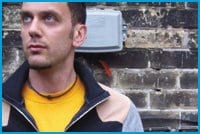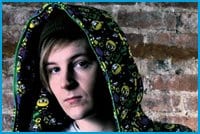
COME AS YOU ARE. Electronica musician Vogler will be mixing things up in the Free Zone.
For many of us the words “Pride Toronto” call to mind beer garden binges, drug-enhanced rave parties or multiple mimosa brunches. But for those who want it, there is a substance-free alternative.
The Free Zone, a self-proclaimed “drug- and alcohol-free oasis,” is offering up a fun-filled safe space for those Pridegoers who are in recovery, aren’t of legal drinking age or simply choose not to partake in the nonstop frat party that is Pride weekend.
“Pride isn’t all about party, party, party,” says Free Zone co-organizer Greg Downer. “There are a lot of people like me, who have entered recovery and still want to be a part of the celebration.”
Launched by a group of people from addiction-recovery agencies in 1998, the Free Zone is organized and staffed by volunteers who, for years, raised the funds to make it happen. Last year, when the event coordinators were struggling to pull the party together, the Free Zone became part of Pride Toronto, which allowed the event the stable funding it needed to keep it going.
This year the committee is made up of Rosemary Hardwick, who has been helping with the event for many years, and Downer, a recovering crystal meth user who has volunteered since 2005, after missing two Prides because he didn’t know the space existed.
Since 1999 the Free Zone has been held in Paul Kane Parkette, west of Church St on Wellesley. This year programming includes recovery meetings, therapy and holistic services, and live entertainment. The recovery meetings, which will take place inside a tent to offer a measure of anonymity to participants, provide an alternative to the 12-step program, which requires total abstinence. These meetings give those in recovery support to stay clean throughout the day.
“Our major sponsor, the Centre For Addiction And Mental Health, is open to whatever your personal agenda is,” says Downer. “If abstinence is your goal, great, but perhaps harm reduction is or perhaps you’re just at the point where you want to get more information and start looking at your substance use or alcohol use to find out if it’s becoming a problem. We want the recovery meetings to be as inclusive as possible.”
The Free Zone also provides support to people who may need an extra push throughout the day while the meetings are not going on. There will be therapists, friendly sober faces and other types of support.
“If somebody comes to us and says, ‘I’ve been clean for six months and I had a drink today and I’m really upset,’ we have people they can come to and talk to,” says Downer.
The Free Zone has adapted and evolved since its beginnings. In addition to offering a safe space to people in recovery, it’s also offering a Kidzone, which features fun games and activities for half-pint participants and families who want to enjoy a party-like atmosphere without the partying.
“We wanted Free Zone to be very family oriented,” says Downer, “but the difference between us and Family Pride is we have a DJ and live entertainment throughout the day.”
The youth contingent of Pride has also joined up with Free Zone to give the underagers a space to hang out on Pride Sunday.
“As the awareness has gotten out there of Free Zone, and people with different philosophies have come forward, we’ve recognized that it’s important that we start opening up to different people to be as inclusive as possible,” says Downer. “We want to be proactive.”
This year the Free Zone will offer three recovery meetings (10am, 5pm and 9pm), shiatsu massages, free ice cream, a pre-parade DJ and live music throughout the day on Sun, Jun 24. Downer says the variety and quality of entertainment is the main thing that gets people to the event.
“Recovery for many is a very private, personal thing,” he says. “We don’t expect people to come out and say they’re in recovery. They can just come out, be part of the Free Zone and still maintain their confidentiality.”
Downer says part of the challenge of putting on an event like Free Zone is getting people to understand the need for the space.
“Most people in society will never and hopefully would never know what it’s like to have their drug use or alcohol use become an addiction, so most people can’t relate to the challenges in a person’s life who’s in recovery. I think one of the biggest challenges is going to be to try to share that philosophy with everybody else at Pride Toronto who might not understand it, but what’s important to me is the fact that I already know they’re open to it and receptive.”

 Why you can trust Xtra
Why you can trust Xtra


